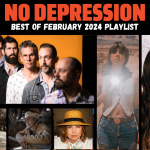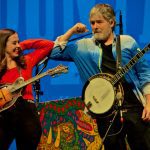Gradual Unfurling – Abigail Washburn’s slow burning ‘City of Refuge’
A review by Doug Heselgrave
The first time I heard Abigail Washburn was at the Vancouver Folk Festival a few years ago, and I have to admit one of the reasons I rushed to her performance was because I’d been told that Bela Fleck was in her band. Of course, I now know that the pair are married and that they’ve been making more than music together for some time now, but sometimes it’s interesting to reflect back on what drew us to an artist in the first place. Ms. Washburn was touring with the Sparrow Quintet and playing songs from their 2008 album. I was absolutely entranced by how she and her band mates could blend traditional banjo melodies with Chinese folk music while segueing through experimental jazz phrases and ideas. I was entranced and amazed, and of course walked over to the merch tent and bought the CD right away.
When I got into my car to go home, I popped the CD into my stereo and began to listen to ‘The Sparrow Quartet’. It wasn’t the same. The dynamic interplay that was so stunning just an hour previously on stage didn’t translate very well into a recording. The songs seemed overly busy and hard to fathom.
I felt that way for months when I tried to listen to ‘The Sparrow Quartet’ at home. I’m sure you’ve all had the experience of feeling disappointed after listening to a studio recording by a band who puts on superlative live performances (Grateful Dead anyone?), so I kind of forgot about Abigail Washburn for a while and moved on to other things.
Fast forward a year. My daughters – determined to bring me into the 21st century – bought me an ipod and I dutifully downloaded hundreds of CDs onto it – The Sparrow Quartet among them. And, then a funny thing happened – every time I pressed ‘play’ Abigail Washburn’s music came on, and somehow, taken out of context and coming at me from the side, her music started to sound ‘right’ to me, and after a few days and for a couple of weeks after that, I listened to almost nothing else.
Then, about a month ago, a couple of big packages arrived from Rounder and Nonesuch Records on the same day. Inside were new albums by Laurie Anderson, Gregg Allman and Abigail Washburn – a strange trio to be sure. I admire all three artists in different ways and wasn’t sure what to listen to first. After some deliberation, I spent a few days with Laurie Anderson’s ‘Homeland’ because I’d enjoyed her performance of this piece so much when she presented it in Vancouver a year or so ago. I continue to be amazed by how she melds academic music and pop sensibilities so successfully. I decided to give Gregg Allman’s much touted collaboration with T Bone Burnett a spin next – because it would most certainly be a huge departure from Ms. Anderson’s political aestheticism.
With all due respect to Mr. Allman, I haven’t been able to get into “Low Country Blues” no matter how hard I try. It’s a beautifully recorded album with flawless instrumental performances and the singing is heartfelt throughout, but I just can’t find anything to grab onto. Maybe it’s Laurie Anderson’s fault. Her record is rooted in the contemporary with an ear to the future, and Allman’s album is an ode to survival and a celebration of a past that perhaps never truly existed. The rugged singular vision that has carried Allman through is admirable. I’m rooting for him and hope he continues to do what he does best, but nothing on “Low Country Blues” touches my heart of fires my imagination in any way. We’ve all been there before.
That just left Abigail Washburn’s “City of Refuge.” Now, a few weeks later, I’m starting to think that the folks at Rounder and Nonesuch sent me the records by Gregg Allman and Laurie Anderson in order for me to truly appreciate just how great Washburn’s new album is.
Certainly, all of the press hasn’t been good. Dustin Ogden’s thoughtful review filled me with fear that Washburn had sold out and I found myself clicking through the disc to hear if the dreaded ‘pop songs’ which he’d written about. Ogden raised some very valid points, and to an extent I agree with him. A song like “Chains” really shouldn’t be on “City of Refuge” – but I’m getting ahead of myself.
Abigail Washburn’s music – like Gregg Allman’s – is grounded in something ancient and timeless. Washburn’s banjo playing conjures up imagined American pasts, Appalachian mountains, mid-western valleys, cross country treks and ocean voyages. Her tone easily ranges from Doc Boggs darkness to Jerry Garcia filigrees of light to envelope her listener in a comfortable sonic space. But, she doesn’t stop there and that’s what distinguishes her from an artist like Gregg Allman who – at least in an aesthetic sense – is forever looking back over his shoulder towards the past for his inspiration. Washburn acknowledges the past and uses what she’s taken from it to create music that is engaging, challenging and new. Washburn doesn’t burn bridges or throw out the baby with the bath water when she creates music, so in that sense, she’ll never be the obvious groundbreaker that Laurie Anderson has always been. But, she may just be a better artist overall.
Much has been written about how Washburn incorporates elements of Chinese string music and melodies into her compositions. While the songs on “City of Refuge” expand on some of the musical ideas from “The Sparrow Quartet”, the interposition of Chinese musical elements seems much more natural and integral to the songs this time out. American rhythms and riffs from the Chinese Banjo sound completely natural as they fuse to create a sound that is Washburn’s alone. Aided and abetted by Bill Frisell on guitar as well as a host of musicians from the Decembrists, My Morning Jacket and the Old Crow Medicine show, the musical soundscape that Washburn creates is certainly some of the most thrilling and challenging I’ve heard in some time. The playing is flawless, while the approach is fierce and sincere.
So – I puzzled – why the pop songs? Was Washburn afraid that no one would listen to her otherwise, or did her label force her to record something that country audiences could relate to? I don’t think so. I could be wrong, but the more I listened to “City of Refuge”, the more I kept thinking of Paul Simon’s “Graceland.” Maybe Washburn chose to drape her more outré musical ideas around country song structures so that we’d have something to hold onto when the going got weird or too ‘out there’. I’m not sure, but even songs like “Chains” or “Last Train” that sound pretty conventional when listened to from a distance get pretty weird when examined up close. Too many weird twists and turns for radio songs, I can only surmise that Washburn offers her listeners the familiar as a place of refuge – as the title suggests.
In the end, whether or not one cares for the music on ‘City of Refuge’ is a matter of personal taste, and I certainly respect all of the criticism that’s been levelled against it. Still, at the end of the day, whatever one’s opinion, Abigail Washburn is an important artist who continues to expand our ideas of what is musically possible. For that reason, and many more,‘City of Refuge’ is essential listening.
This review also appears at www.restlessandreal.blogspot.com




